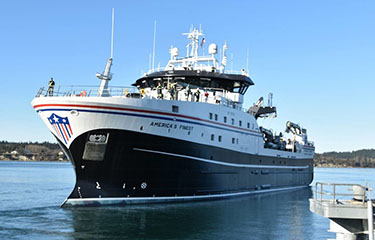Kirkland, Washington, U.S.A.-based Fishermen’s Finest has lost an appeal challenging fishing limits contained in a Jones Act waiver it received for its newly-built America’s Finest vessel.
The ruling, delivered 8 February, 2023, by the U.S. Court of Appeals for the Federal Circuit, found against Fishermen’s Finest’s contestation its rights under the Fifth Amendment of the U.S. Constitution were violated by the limits, or sideboards, contained in the Frank LoBiondo Coast Guard Authorization Act of 2018, which was signed into law in 2018. The law gave Fishermen’s Finest a waiver to the Jones Act, which would have prohibited its newly-built vessel, the USD 75 million (then EUR 65.9 million) America’s Finest, from operating in U.S. waters due to the fact that it was constructed with 10 percent foreign steel.
However, the waiver also placed some limitations on the number of fish the three vessels in Fishermen’s Finest’s fleet could catch through a six-year period following the law’s passage. That was done after officials in the U.S. state of Alaska raised concerns that the ship could impact processors at the state’s Dutch Harbor port, the nation’s largest fishing port. Two of Fishermen’s Finest’s competitors, Seattle, Washington, U.S.A.-based Trident Seafoods and Seattle-based United States Seafoods, hired lobbyists to push for the limits, which were ultimately negotiated between U.S. Senator Maria Cantwell (D-Washington) and U.S. Senator Dan Sullivan (R-Alaska), according to the Skagit Valley Herald.
As a result, through 2024, Fishermen’s Finest faces 53 separate limitations on the Amendment 80 allocations and unallocated catches, including of yellowfin sole, flathead sole, rock sole, Atka mackerel, and Pacific ocean perch, according to the Herald.
Fishermen’s Finest sued the U.S. government in 2021 to seek the removal of the limitation, citing the Fifth Amendment, which provides that private property “shall not be taken for public use without just compensation.”
But the Court of Appeals ruled fishing permits and licenses granted by the U.S. government are revocable privileges, rather than compensable property.
“[Fishermen’s Finest’s] licenses and permits did not have the essential characteristics of compensable property – transferability and the right to exclude others,” it said in its decision. “[Fishermen’s Finest] do[es] not have a cognizable property interest in the right to conduct commercial fishing activities in any part of the [U.S. exclusive economic zone].”
While previous precedent had already decided this issue, Fishermen’s Finest had argued amendments made by the U.S. Congress to the Magnuson-Stevens Act in 2007 “altered the nature of fishing endorsements, licenses, and permits such that they now bear the traditional hallmarks of compensable property transferability, exclusivity, and irrevocability.”
But the appeals court disagreed ...
Photo courtesy of Fishermen’s Finest








